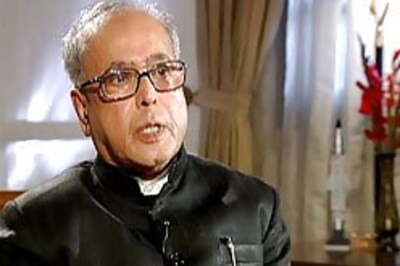
views
Lucknow: The political checkerboard in Uttar Pradesh has been set in a disarray following the release of Bhim Army president Chandrashekar Azad 'Ravan'. It's not just the BJP for which the Dalit youth leader is a political threat; the Opposition, too, will have to redefine its strategy. As of now, it seems Ravan's political maneuvering can give the Congress an ace up its sleeve against the dominant BSP and SP in the state.
Since his release from Saharanpur Jail in the wee hours of Friday, statements and meetings of the Bhim Army chief present an interesting reading. While he is absolutely clear in his opposition to the BJP, he has sent indirect, though strong, signals of warming up to the Congress leadership.
News18 has a video of Azad's meeting with Imran Masood, the Congress heavyweight in West UP. Masood, who is also UP Congress's vice president, had immediately called upon Azad at the latter's village, along with party MLAs Masood Akhtar and Naresh Saini, in Saharanpur. The new-found bonhomie between the two leaders will clearly be music to the ears of top Congress leaders, including party president Rahul Gandhi.
In the video, Azad says: "Imran is like my brother. I can sacrifice my life for him. Whichever party he may be with, I will be with him. The sacrifices Imran made for Dalits cannot be forgotten." 'Ravan' goes on to add, "Dalit-Muslim unity is the pressing need of the hour. We will strive for it." The video ends with a brotherly embrace between the two leaders as supporters cheer.
Political observers feel the meeting stands as testimony to the speculations of Azad being in touch with the Congress's top leadership while he was behind bars. Politically speaking, it now gives the Congress better bargaining power vis-a-vis the Bahujan Samaj Party (BSP). It's no hidden secret that BSP chief Mayawati has been playing a hard negotiator with the Congress on the issue of seat-sharing for 2019.
In fact, as recently as September 10, both the BSP and Samajwadi Party (SP) had cold-shouldered the Congress during the Bharat Bandh. While both the parties refrained from joining the Rahul Gandhi-led protest in Delhi, Mayawati went ahead to draw a similarity between the Modi government and the Manmohan Singh-led UPA-II while speaking on the issue of fuel price hike.
With the Bhim Army chief appealing to the non-BJP parties to join ranks ahead of the 2019 elections, it seems the Dalit leader intends to play an independent role in the proposed front. Politically, it might be the correct move for him. Keeping the caste consciousness in mind, he may not be in a position to outrightly stand against the BSP, but in alliance politics, he can surely have a role to play.
No doubt then, Azad's increasing political aggression will be a cause of concern for the BSP. The Bhim Army is a crucial factor in West UP, which Mayawati can't ignore, more so because Azad comes from the same sub-caste within Dalits to which Mayawati belongs.
Therefore, in larger political discourse, it can well reduce her bargaining power with the Congress. Similarly, for the SP, Azad's great emphasis on Dalit-Muslim unity will be a cause of concern.
If the young Dalit leader can actually strengthen this combination, Samajwadi Party's political confidence about minority support can be shaken. Results of Kairana prove the strength of this Dalit-Muslim formula. The Kairana Lok Sabha bypolls saw the first Muslim candidate win against the BJP in UP since the party swept to power in 2014. In this election, while the BSP has been silent about its support to Rashtriya Lok Dal (RLD) and SP's joint candidate, it was the Bhim Army that aggressively worked on the ground.
In several districts of west UP, Dalit and Muslims together form a strong vote percentage. While in Saharanpur, Dalit vote percentage is around 22 per cent, in Bijnor, Aligarh, Bulandshahar and Agra too, they are above 20 per cent. Similarly, Muzaffarnagar, Meerut, Baghpat, Ghaziabad and Gautam Budh Nagar are other areas where Dalit and Muslims together can have a major impact on election results.
For the BJP, too, Azad has a slightly "militant political approach" and emphasis on Dalit-Muslim unity can be of some help. Though it's too early to predict, but BJP leaders feel it may help upper caste voters, especially in West UP, look back towards the party. This section had been annoyed with the party following amendments in the SC/ST Act.


















Comments
0 comment